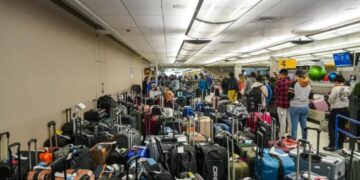By: Christos Makridis
Over 60% of Southwest Airlines’ (SWA) flights – over 15,200 total flights – were canceled this holiday season. Although all airlines struggled due to the severe blizzard on the East, which led to abnormally high staffing shortages as some personnel were unable to make their routes, SWA was unique in that their technology infrastructure failed to allow for all the required crew reassignments to handle the chaos.
Southwest bags at Denver International Airport
Source: USA Today, Kathleen Wong
The airline industry, among other skilled trades sectors, has suffered from a labor shortage for several years. But the lockdowns over the COVID-19 pandemic led to a sharp decline in demand that quickly rebounded, starting in the summer, and airlines have not been able to hire quickly enough.
“The grounding of business travel has led to steep declines in employment in hotels, conference services, rail and bus transportation, and travel booking,” according to a 2022 report by the Burning Glass Institute. The shortage of workers, coupled with the fragility of the technology infrastructure, led to a perfect storm that overwhelmed SWA capacity.
“The storm was the catalyst that started this whole event, but the major problem is that our scheduling IT infrastructure is outdated and can’t handle the massive cancellations that had to happen that day when the weather event occurred,” said Capt. Michael Santoro, vice president of the Southwest Airlines Pilots Association in an interview with CBS News. The infrastructure can only process up to 300 crew reassignments, so “you get this snowball effect where it can’t keep track of where pilots are, flight attendants are and airplanes are,” he continued.
SWA leadership has acknowledged the need for technology modernization. “Part of what we’re suffering is a lack of tools. We’ve talked an awful lot about modernizing the operation, and the need to do that. And Crew Scheduling is one of the places that we need to invest in,” the message says. “We need to be able to produce solutions faster. We need to be able to communicate with each other where it doesn’t involve a phone call. Those things have been committed to and invested in, and you’re going to see improvements there,” said Southwest CEO Robert Jordan in a Christmas Day message to employees.
Comparison of flight cancellations across airlines
Source: FlightRadar24 and graphic by Matt Stiles, CNN
Although SWA anticipates resuming normal operations at the start of the new year, hundreds of thousands have had to fundamentally readjust their travel plans and deal with missing luggage, coming at an especially challenging time for most families. That has led to substantial attack by Pete Buttigieg, the Secretary of the Department of Transportation, calling for an investigation. “The department will examine whether cancellations were controllable and if Southwest is complying with its customer service plan,” tweeted the DOT.
However, scholars and practitioners remain skeptical about whether the absence of regulation was the culprit or whether additional regulation would help reduce the probability of a future crisis of this scale. “The airlines don’t need more regulation, the bad publicity is punishing them enough. Not every problem can be solved by more regulation—nor does it have to be,” said Diana Furchtgott-Roth, scholar at the Heritage Foundation scholar and former chief economist of the US Department of Labor.
“Regulation would not prevent the problems that plagued Southwest over the past few days. Airlines are already held accountable for delays and lost baggage. In other areas, such as drone delivery and vertical flying taxis, regulations are hampering innovation and preventing promising technology from being used by the public,” she continued.
Regulatory restrictions have grown by 1.5% in the airline industry between 2019 and 2021, compared with 1.7% in the economy as a whole, according to QuantGov, a regulatory database led by Patrick McLaughlin at the Mercatus Center at George Mason University. The measure reflects specific restrictions that are put in place and detected by scraping and analyzing the Code of Federal Regulations – the registrar where all regulations are released. These similar rates of regulatory expansion suggest that the current crisis is not a result of the absence of regulation.
By many accounts, the wave of regulation that hit the airlines in the late 1970s as a result of the Airline Deregulation Act in 1978 was a success, particularly for enabling more efficient cargo shipping, according to research by Kenneth Button and David Christensen at the Mercatus Center. However, that was a long time ago and oligopolies have formed within the airline industry with much less competition and competitive differentiation than intended, according to a 2018 report by Robert Peterson in TR News. “Was deregulation successful? By virtually all measures, the answer is yes; however, today’s system bears little resemblance to the aviation future described by deregulation advocates in the 1970s,” said Peterson.
Airbus A320 Airplane at airport runway
Source: Trac Vu on Unsplash
Southwest will have an opportunity to begin rebuilding its reputation over the upcoming year, but the economy’s ongoing struggle with persistent labor shortages will continue having adverse and often unexpected consequences if not dealt with.




